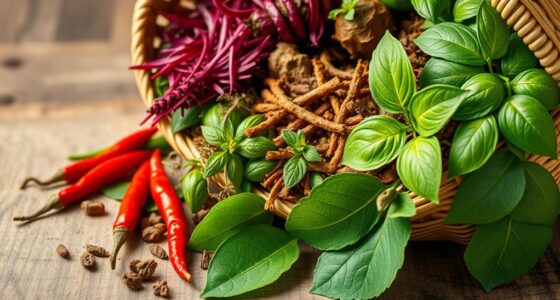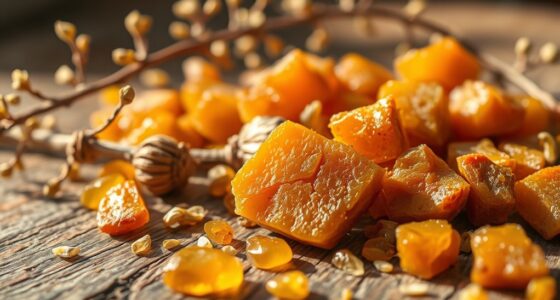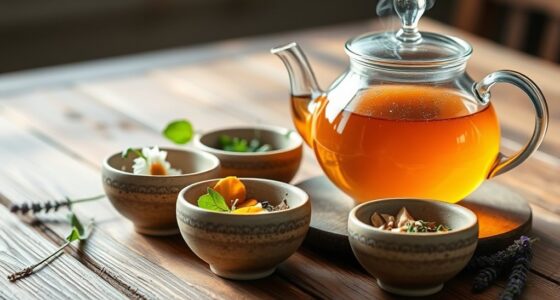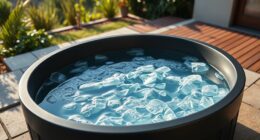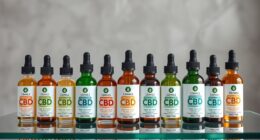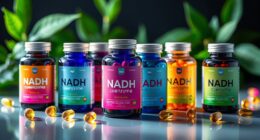Chronic inflammation speeds up aging by damaging tissues and disrupting immune balance, but herbs like turmeric, ginger, and garlic can help cool this internal fire. These natural compounds have anti-inflammatory and antioxidant properties that reduce immune overactivity and oxidative stress. By including these herbs in your diet and adopting healthy habits, you can support your body’s defenses and slow aging signs. Keep exploring to discover how specific herbs and lifestyle choices can further enhance your well-being.
Key Takeaways
- Herbs like turmeric and ginger contain compounds that reduce inflammation and oxidative stress, supporting healthier aging.
- Natural herbs can help regulate immune responses, preventing chronic inflammation that accelerates tissue damage.
- Incorporating anti-inflammatory herbs into the diet, combined with lifestyle practices, boosts the body’s ability to fight aging-related inflammation.
- Herbs with antioxidant properties combat free radicals, decreasing oxidative damage that contributes to cellular aging.
- A holistic approach using herbs and healthy habits can “cool” the internal fire of inflammation, promoting longevity and vitality.
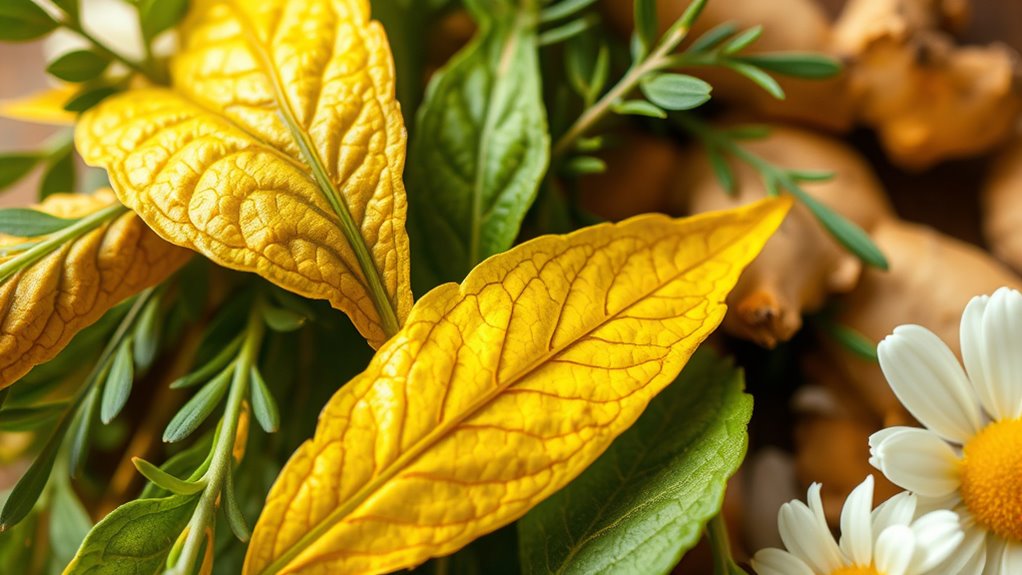
Have you ever wondered how inflammation affects the aging process? As you get older, your body’s inflammatory response can start to run amok, leading to chronic low-grade inflammation that accelerates aging and increases vulnerability to disease. This persistent inflammation doesn’t happen in isolation; it’s closely linked to your immune response and oxidative stress. When your immune system reacts to threats—like infections or damaged cells—it releases chemicals designed to fight off harm. But over time, this response can become dysregulated, causing your immune system to produce excessive inflammatory signals even when there’s no real threat. This ongoing, low-level inflammation is a key driver of tissue damage, cellular aging, and the decline of organ function.
Chronic inflammation accelerates aging by damaging tissues and disrupting immune balance.
Oxidative stress also plays a significant role here. It occurs when free radicals—unstable molecules produced during normal metabolic processes—outnumber your body’s antioxidant defenses. These free radicals damage cells, DNA, and proteins, further fueling inflammation. As you age, your body’s ability to neutralize oxidative stress diminishes, allowing oxidative damage to accumulate. This, in turn, sparks more inflammation, creating a vicious cycle that speeds up the aging process. The combination of a heightened immune response and increased oxidative stress results in wear and tear on your tissues, which manifests as wrinkles, joint pain, decreased cognitive function, and other age-related conditions.
Your lifestyle choices and diet can influence this inflammatory cycle. Chronic stress, poor sleep, lack of exercise, and an unhealthy diet rich in processed foods can all amplify inflammation. Conversely, certain herbs have been shown to help modulate the immune response and combat oxidative stress. For example, turmeric contains curcumin, which has potent anti-inflammatory properties that can help “cool” the immune system’s overactivity. Similarly, ginger and garlic have antioxidant effects that can reduce oxidative stress, protecting your cells from damage. Incorporating these herbs into your daily routine can support your body’s natural defenses and slow down the inflammation-driven aspects of aging.
Understanding how inflammation interacts with your immune response and oxidative stress gives you a powerful tool to age more gracefully. By choosing anti-inflammatory herbs, adopting a healthy lifestyle, and managing stress, you can help keep the fire within at bay. This proactive approach not only preserves your youthful vitality but also reduces your risk of age-related diseases, allowing you to enjoy your later years with greater health and resilience.
Frequently Asked Questions
Can Herbal Remedies Completely Reverse Age-Related Inflammation?
You might wonder if herbal remedies can fully reverse age-related inflammation. While herbs with strong potency can reduce inflammation markers and support your body’s natural defenses, they can’t completely eliminate the aging process. Instead, they help manage chronic inflammation, promoting better health and vigor. Incorporating these herbs into your routine boosts your body’s ability to cool the fire within, but a holistic approach remains essential for ideal results.
Are There Any Side Effects of Long-Term Herbal Use for Inflammation?
You wonder if long-term herbal use for inflammation has side effects. While herbs can be beneficial, you should be aware of potential herbal interactions and dosage considerations. Using herbs excessively or without guidance might cause adverse effects or interact with medications. To stay safe, consult a healthcare professional, follow recommended dosages, and monitor your body’s response. This approach helps you enjoy herbal benefits while minimizing risks over time.
How Do Herbs Compare to Pharmaceuticals in Managing Inflammation?
Think of herbs as gentle warriors fighting inflammation, while pharmaceuticals are like precision-guided missiles. Herbal potency varies, often providing a gentle yet sustained effect, whereas pharmaceutical efficacy delivers quick, targeted results. You might find herbs offer fewer side effects and support your overall health, but they may take longer to show results. Choosing between them depends on your body’s needs, but combining both can create a balanced approach.
Which Herbs Are Most Effective for Age-Related Chronic Inflammation?
You’ll find that herbs like turmeric and ginger are highly effective for age-related chronic inflammation. Turmeric benefits include powerful anti-inflammatory properties that help reduce joint pain and stiffness, while ginger effects can improve circulation and lower inflammation markers. Incorporating these herbs into your diet can support your overall health, providing natural relief and promoting longevity without the side effects often associated with pharmaceuticals.
Can Lifestyle Changes Enhance the Anti-Inflammatory Effects of Herbs?
You can definitely boost the anti-inflammatory effects of herbs by making simple lifestyle changes. Improving your dietary habits, like eating more anti-inflammatory foods, supports this goal. Additionally, managing stress through meditation or exercise helps reduce inflammation naturally. When you combine these habits with herbal remedies, you enhance their effectiveness, creating a powerful approach to reducing chronic inflammation and promoting healthier aging.
Conclusion
By harnessing the power of herbs, you can literally put out the raging fire of inflammation burning inside you. Imagine turning back the relentless clock, feeling younger, stronger, and more vibrant with every teaspoon of nature’s medicine. Don’t just fight inflammation—obliterate it like a superhero wielding a herbal sword! The secret to defying aging might be as simple as reaching for those ancient, powerful plants. So, why wait? Cool that fiery inner blaze today!



